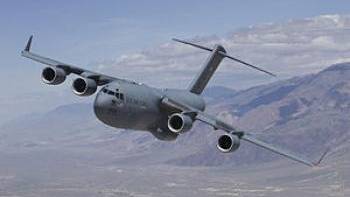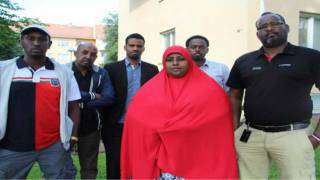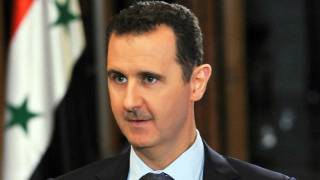Military Intervention in Mali: Special Operation to Recolonize Africa
Source: strategic-culture.org
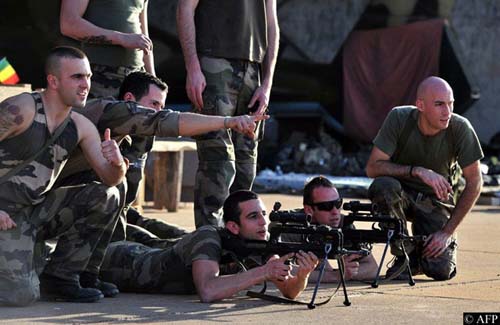
The military operation in Mali launched on January 11 is another vivid example of special activities aimed at recolonization of the African continent. It’s an orderly and consistent capture of new African territories by Western powers. They have got hold of Sudan by dismembering it (taking away the oil deposits from the major part of the country), the Nigerian oilfields have been captured in accordance with the International Court of Justice rulings, (1), Libya has been captured as a result of direct military intervention, Cote D’Ivoire has been conquered thanks to a small-scale military action conducted under the aegis of the United Nations. The way to do the things differ, but the result is the same. The process of recolonization picks up momentum in Africa…
The mistakes of previous aggressive actions were taken into consideration while occupying Mali. Today everyone is sure the West is defending Mali’s sovereignty and territorial integrity. Not exactly so, as some facts tell us. In reality it was not in 2011-2012 when the terrorist groups appeared in the north of the country. They had been organizing and conducting activities there for dozens of years. (2) The situation exploded because the Libyan weapons were captured after the Gaddafi’s overthrow. The military materials didn’t get to Mali by themselves; there are facts to prove France was involved in their transfer from Libya.
The very logic of events in the North of Mali in 2012 proves it is a well-orchestrated performance aimed at preparing the public opinion for “an imperative of military intervention”. That’s how it was arranged that Libyan arms spread around and wound up in the hands of Tuaregs. It incited military actions. But pretty soon the Tuaregs understood they were being used and started to dissociate themselves from the independence they had declared previously. The National Movement for the Liberation of Azawad (French: Mouvement National pour la Libération de l’Azawad; MNLA) said the declaration of independence was “an attempt to draw international attention to the plight of the population in the north” and expressed willingness to hold talks. (3) That’s what the National Movement for the Liberation of Azawad was attacked for by real perpetrators of the provocation - the Al-Qaeda in the Islamic Maghreb (AQIM) and the Islamists of Movement for Unity and Jihad in West Africa (MUJWA or MUJAO). Ansar Dine said it was ready to join without delay. At the November meeting in Ouagadougou, Burkina Faso, the group said it rejected violence, extremism and terrorism and assumed the responsibility for fighting organized crime across the border. (4) The Ansar Dine’s turn around led to its involvement into fighting. In November combat actions were sparked, the National Movement for the Liberation of Azawad fought the opposing Al-Qaeda in the Islamic Maghreb and the Movement for Unity and Jihad in West Africa. By the end of November Ansar Dine waged combat actions against the Movement for Unity and Jihad in West Africa forces in the south-western part of Timbuktu. Finally, all these battles made part of the strategy aimed at the destabilization of Mali. All the events described here take place against the background of jihad and terrorist groups coming to the North of Mali to reinforce the armed formations. (5) The Mali’s northern terrorist land has really become international while getting support from all leading terrorist forces in the region, including the well-known Nigerian Boco Harum.
According to the United Nations Secretary General’s estimations, the capture of the northern part of the country resulted in around half a million refugees and over 200 thousand migrants inside the country. The humanitarian disaster spread to all neighboring countries. That was the goal. All Muslim shrines in Timbuktu and other Sahara’s ancient historical centers were destroyed to strengthen the effect. The actions had no other mission but to “shock” international community and make it realize a military intervention was an “imperative”. That’s the right context for making out what was behind the state coup that took place in Mali in March 2012, a few days before the presidential election President Amadou Toumani Toure was toppled. There seemed to be no logic in staging the coup (they toppled the president who was not a candidate for the next term), but it can be easily explained by the fact that the President and the most probable winners were all opponents of the Western military intervention.
After the coup, the idea of foreign intervention received a new strong impetus. The new government of Mali asks the United Nations for military assistance and launches a complaint to the International Criminal Court. But the concept of military intervention was still a matter of internal strife between the supporters of the Western “assistance” and inter-African military mission. Probably these two different approaches were the main reason for failure of the attempted coup at the end of April (6) and then for a new military coup that swept away Prime-Minister Modibo Diarra.
It’s not an occasion that the United Nations Security Council resolutely condemned the then ongoing intervention of Mali’s military and security forces into the activities of Mali’s transitional government. It expressed its readiness to tackle the issue of imposing sanctions against those who breached the constitutional order. Thus, it’s not the Al Qaeda’s leaders but rather the Mali’s military who was threatened with the Security Council sanctions!!!
At last, the United Nations Security Council’s resolution N 2085 was adopted on December 20, 2012 authorizing the military intervention in the country. (7) The African-led International Support Mission to Mali (AFISMA) was allowed to be deployed. The force is to include Malian (5000 men strong) and international (3300) forces. The concept was worked out by Malian authorities together with “partners” and approved by the African Union and ECOWAS. Now, who are the Malian partners? The USA, France, Germany, Canada, Algeria, Mauritania and Niger.
At the beginning of January, Al Qaeda forces in the northern part of the country adopted a behavior that ran contrary to logic; they launched an offensive to the South. The city of Kona was captured on January 7. From geographical point of view the city is of critical importance, it is situated at the conditional border between the country’s North and South, so the action actually meant the start of offensive against the territory where the major part of population lives. In case the offensive had any military importance for Al Qaeda, it could have been launched before the resolution 2085, for instance right after a number of coups in Bamako or any other time suitable for the Al-Qaeda in the Islamic Maghreb. At that, it is launched right after the ruling on international military operation. The only thing the offensive could be seen as is a provocation of immediate invasion, not anything else. In the evening of January10 Interim Mali President Dionkunda Traore declared total mobilization and the state of emergency. (8)
On January 11 French forces landed in Mali. Information agencies mention other participants of the operation (Senegal, Niger); still everyone knows who plays the leading part. By the way it became clear on the very day the resolution 2085 was adopted, when the Malian Minister of Foreign Affairs said thank you among other things to all UN Security Council members but expressed special gratitude to France. (9) It should be noted the information on the ECOWAS decision to launch immediate deployment of troops was made public right after the news that the French force was on the way. That is the French started the operation before the physical arrival of African troops.
The perfectly arranged information campaign highlighting the “international intervention in Mali” has one drawback – there is no reasonable explanation of what is behind the Al-Qaeda in the Islamic Maghreb’s actions. Today they talk about the attempts to make the northern part of Mali a long-time base. But Al Qaeda had been doing it for the last dozen of years without attracting attention. In reality the current AQIM’s actions are flagrantly provocative aimed at giving a pretext for foreign intervention.
[...]
Read the full article at: strategic-culture.org
Canada joins military intervention in Mali -- a reminder we need more debate on foreign policy
By Derrick O’Keefe | Rabble.ca
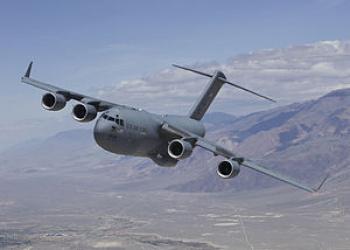
Canada has joined another foreign military intervention. This time in the West African country of Mali, where at least 11 civilians were killed in French bombing raids that began over the weekend.
[Canadian Prime Minister] Harper was forced to disclose the details of Canada’s involvement yesterday, because of a tweet by the president of Mali.
No, seriously.
The Ottawa Citizen reports:
A tweet by the president of Mali forced the Conservative government to admit Monday that it has committed Canadian military forces to help support the war against al-Qaeda-linked rebels in that country.
Several hours after the Citizen published an article Monday on the commitment of Canadian military logistical support to Mali’s military, Prime Minister Stephen Harper acknowledged that Canada was indeed involved.
“Today our Government received a specific request from the French Government for heavy-lift aircraft to assist in the transport of equipment into the Malian capital of Bamako, a location that is not part of any active combat zone,” Harper said in a statement.
“The Government of Canada will support our allies in this request and will be providing one RCAF C-17 transport aircraft in a non-combat role to support operations for a period of one week. The RCAF aircraft will not operate in any combat zone."
So, what’s the big deal? It’s just going to be one C-17 transport plane to assist the French forces leading the attack. The plane will be made available for a week, and then Canada’s role will be reviewed.
Nothing to see here folks, please move along...
Except this is a big deal. Big interventions start with small deployments -- with "advisors," with "non-combat" assistance, or with "training forces" etc.
Besides, anytime Canada joins a new military intervention abroad it should be the subject of serious and sustained debate. Unfortunately foreign policy is rarely discussed, and Africa is especially off the radar -- the CBC was forced to close its Africa bureau due to recent budget cuts.
Overall, it barely needs to be said, anti-war perspectives are rarely given a media spotlight in Canada. More than the details of any one intervention, in fact, the lack of real debate about Harper’s transformation of Canadian foreign policy is glaring. The development of foreign bases for Canadian troops and the big emphasis on expanding Canadian Special Forces are two crucial elements to point out: a global military presence, or at least the capacity to join "quick strike" operations anywhere around the globe, is considered an essential part of keeping the world safe for the interests of Canadian capital.
(Note: Canadian gold mining companies have operations in Mali.)
[...]
Read the full article at: rabble.ca
